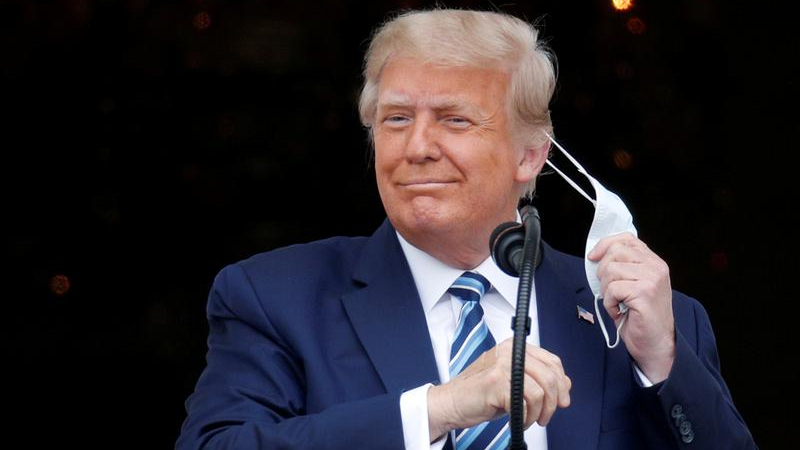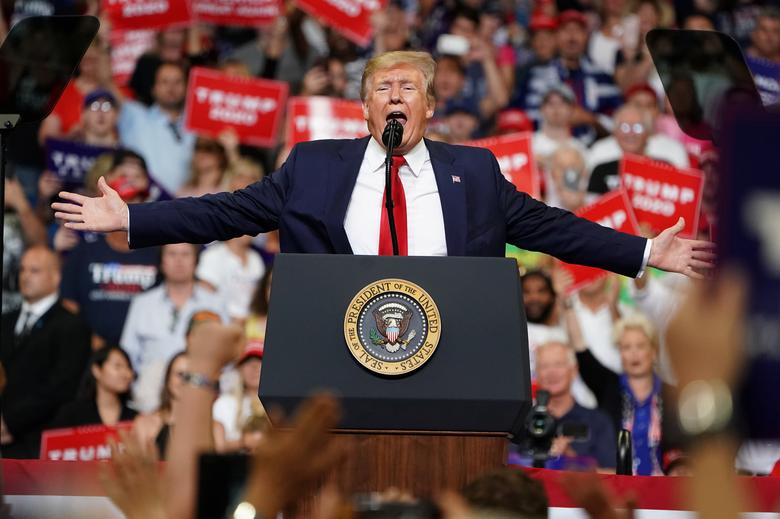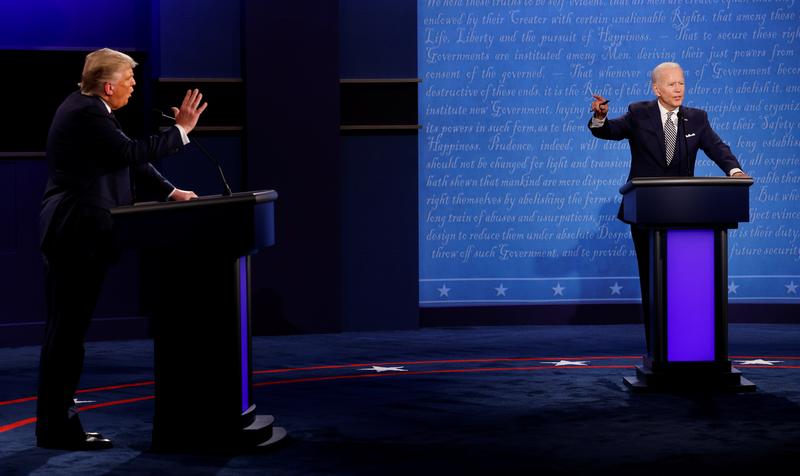04:02

U.S. President Donald Trump returned to the campaign trail on Monday for the first time since he announced his COVID-19 diagnosis, touting his management of the pandemic as opinion polls showed him losing more ground to Democratic rival Joe Biden.
Trump arrived at the outdoor rally in Sanford, Florida, the first of six planned for this week, without a face mask.
He tossed out masks to thousands of supporters standing shoulder to shoulder, most without face coverings, and repeatedly talked about his recovery from the coronavirus.
"I went through it now. They say I'm immune. I feel so powerful," Trump told the crowd during his hour-long remarks. "I will kiss everyone in that audience, I will kiss the guys and the beautiful women, I will give you a big fat kiss."
He told supporters that coronavirus safety lockdowns had done great damage to the economy and were too drastic. "It's risky, but you gotta get out," he told supporters, who chanted: "We love you."
Graphics: Biden extends lead in fallout from Trump's tough week
Critics have faulted Trump for failing to encourage supporters at campaign events, and White House staff, to wear protective masks and abide by social-distancing guidelines.
At least 11 close Trump aides have tested positive for the virus.
As Trump was holding his rally, top U.S. infectious disease expert Anthony Fauci told CNBC the United States faced a "whole lot of trouble" if it did not encourage universal wearing of face masks and avoid mass gatherings.
The rally came hours after the White House physician Sean Conley said Trump had tested negative for COVID-19 on consecutive days and was not infectious to others. The president tested negative "on consecutive days" and is "not infectious to others," according to a memo from Conley.

U.S. President Donald Trump speaks during a campaign rally, his first since being treated for COVID-19, at Orlando Sanford International Airport in Sanford, Florida, U.S., October 12, 2020. /Reuters
U.S. President Donald Trump speaks during a campaign rally, his first since being treated for COVID-19, at Orlando Sanford International Airport in Sanford, Florida, U.S., October 12, 2020. /Reuters
On Sunday, Trump's assertion that he was now immune to the virus, made without evidence, drew a flag from Twitter for violating the social media platform's rules about misleading information related to COVID-19. Scientific research has been inconclusive on how long people who have recovered from COVID-19 have antibodies and are protected from a second infection.
Trump's evening rally at an airport in Sanford, Florida, will begin a three-week sprint to Election Day as new polls show him losing more ground to Democratic rival Joe Biden in two battleground states that could decide the November 3 contest.
For months, Trump had worked furiously to shift public attention away from the virus and his handling of the pandemic, which has infected more than 7.8 million people in the United States, killed more than 214,000 and put millions out of work.
His own illness has put the spotlight squarely on his coronavirus response during the closing stretch of the race, with the Biden campaign scaling up its attacks and stretching its campaign into states that normally lean Republican.
Trump is seeking to change the dynamics of a race that national opinion polls and some state polls show he is losing to Biden.
Biden tested negative for COVID-19 on Monday, his campaign team said in a statement. The former vice president has tested negative a number of times since Trump announced his positive test.
Biden has pulled further ahead in Wisconsin and Pennsylvania, building momentum in two states that Trump carried in the 2016 presidential election, Reuters/Ipsos opinion polls showed on Monday.
The polls, conducted Tuesday through Sunday, showed Biden now leading Trump by 7 percentage points in both states.
Taking advantage of his momentum and growing advantage in the polls, Biden on Monday campaigned in Ohio, where he was once considered a long shot, as he tries to expand his reach into Republican-leaning states.

U.S. President Donald Trump and Democratic presidential nominee Joe Biden participate in their first presidential campaign debate held on the campus of the Cleveland Clinic at Case Western Reserve University in Cleveland, Ohio, U.S., September 29, 2020. /Reuters
U.S. President Donald Trump and Democratic presidential nominee Joe Biden participate in their first presidential campaign debate held on the campus of the Cleveland Clinic at Case Western Reserve University in Cleveland, Ohio, U.S., September 29, 2020. /Reuters
Speaking to unionized auto workers in Toledo, Biden said he and former President Barack Obama played a key role in keeping the U.S. auto industry afloat during the financial crisis and recession more than a decade ago.
"Barack and I bet on you and the American worker and it paid off," said Biden, who is hoping to undermine what polls show is Trump's greatest strength, the view among some voters that the former real estate entrepreneur is better at handling the economy.
Biden also appeared at a get-out-the-vote event in Cincinnati in what was his second campaign trip in as many weeks to Ohio, where polls now show a competitive race.
Trump won the state by 8 percentage points four years ago and almost certainly must carry it again to win re-election. No Republican has won the White House without carrying Ohio.
Trump's rally in Florida, and planned rallies in Pennsylvania on Tuesday, Iowa on Wednesday and North Carolina on Thursday, will be watched closely to see whether the president has reshaped his campaign approach since contracting the virus.
(With input from Reuters, Xinhua)